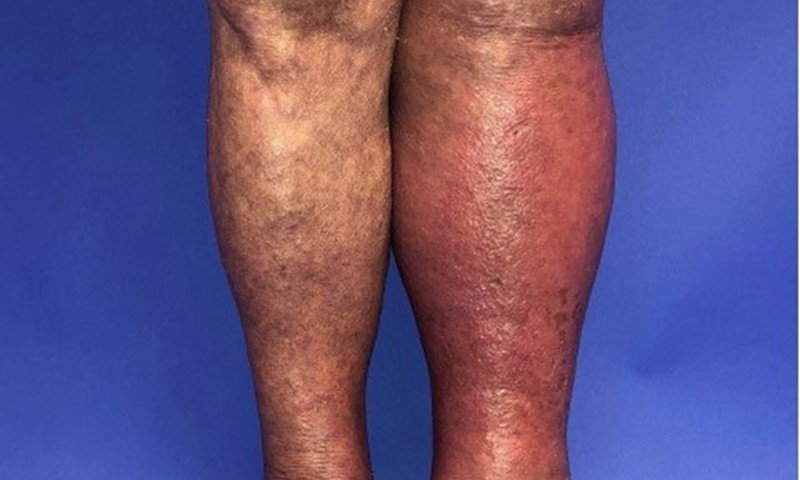About cellulitis
Cellulitis is an infection of the deeper layers of skin and the underlying tissue. It can be serious if not treated promptly.
The infection develops suddenly and can spread through the body quickly. Severe infections can spread deep into the body, and can be life threatening.
Most cases are successfully treated with antibiotics at home, although sometimes it needs to be treated in hospital.
Symptoms of cellulitis
Cellulitis causes an area of skin to suddenly become:
- red
- hot
- swollen
- painful
- tender
It most often affects the lower legs, but can occur anywhere.

Source: https://dermnetnz.org/
In more severe cases, cellulitis can also be accompanied – and often preceded – by:
- a high temperature (fever) of 38C (100.4F) or above
- vigorous shaking (rigors)
- nausea and vomiting
- dizziness
- confusion
These are signs that the infection has spread deeper into the body.
Read more about the symptoms of cellulitis
Pharmacy First Scotland: Cellulitis treatment from your local pharmacy
Adults 18 years and over with symptoms of cellulitis can get advice and treatment directly from a pharmacy in certain instances. This includes cases where cellulitis is linked to an insect bites on the arms or body. If the pharmacist cannot treat you they may recommend you see your GP.
When to get professional advice
See your pharmacist as soon as possible if an area of your skin suddenly turns red, painful and hot.
Early treatment can help reduce the risk of the infection becoming severe.
Phone 999 or go to A&E if:
- your face or the area around your eye is affected
- your symptoms are getting rapidly worse
- you experience other symptoms in addition to the changes in your skin, such as a fever or vomiting
- you have a weak immune system – for example, because of HIV or chemotherapy – or severe lymphoedema, a condition that causes swelling in the body’s tissues
- a young child or elderly person has possible cellulitis
Treatments for cellulitis
Cellulitis is usually treated with antibiotics. Many infections can be treated with antibiotic tablets at home.
We will prescribe a five-day course of treatment, and your symptoms should start to improve after a few days.
Make sure you complete the whole course of medicine you’ve been given, even if you’re feeling better. Contact your pharmacist or GP if your symptoms get worse after a few days or don’t improve within a week.
For serious infections, treatment is usually started in hospital. You’ll normally be given antibiotics directly into a vein through an injection or a drip.
Many hospitals can then arrange for this treatment to continue at home or in an outpatient clinic. Treatment is usually for five days.
If the infection responds to treatment quickly, it may be possible to complete the course with antibiotic tablets instead of having injections or a drip.
Read more about how cellulitis is treated.
Outlook for cellulitis
Cellulitis can usually be treated successfully with antibiotics, and most people make a full recovery.
But there is a risk it could cause potentially serious problems, particularly if it’s not treated quickly, such as:
- blood poisoning (sepsis) – where the bacteria enter the blood
- kidney damage
- leg ulcers
Septicaemia and kidney problems can be life threatening and require immediate treatment in hospital.
Causes of cellulitis
Cellulitis is usually caused by a bacterial infection.
The bacteria that cause it often live harmlessly on the skin, but they can lead to an infection if they get into a break in your skin, such as:
- a bruise, cut or graze
- an animal bite or insect bite
- a leg ulcer
- dry, cracked skin – for example, because of eczema or athlete’s foot
In most cases the trigger for the infection is unknown.
The infection isn’t normally spread from person to person.
Read about the causes of cellulitis, including information on who’s most at risk of the condition.
Preventing cellulitis
If you’ve had cellulitis before, you’re more likely to get it again.
It’s not always possible to prevent it, but the following measures may help reduce your risk:
- use moisturiser if your skin is dry or prone to cracking
- lose weight if you’re overweight – being obese can increase your risk of cellulitis
- try to ensure any conditions that can increase your risk of cellulitis – such as eczema, athlete’s foot, leg ulcers and lymphoedema – are well managed
- make sure any cuts, grazes or bites are kept clean – wash them under running tap water and cover them with a plaster or dressing
- wash your hands regularly – particularly when treating or touching a wound or skin condition
If you get cellulitis often or severely, your GP may refer you to a skin specialist called a dermatologist, or an infection specialist, to discuss the option of taking antibiotics on a long-term basis to protect against further infections.



